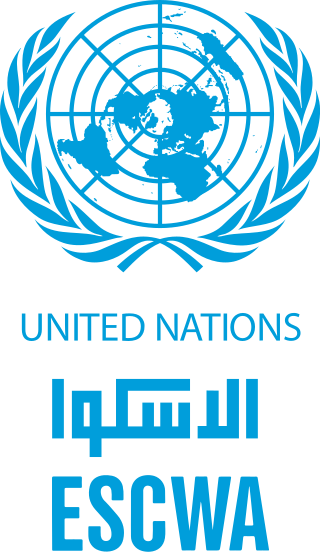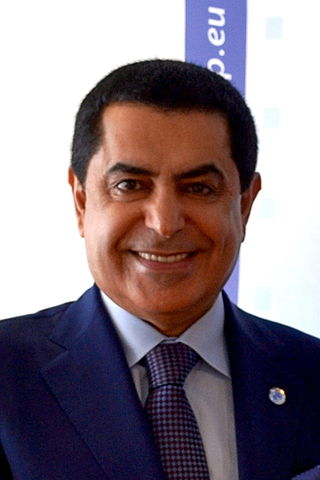
The United Nations General Assembly is one of the six principal organs of the United Nations (UN), serving as its main deliberative, policymaking, and representative organ. Currently in its 78th session, its powers, composition, functions, and procedures are set out in Chapter IV of the United Nations Charter.

The United Nations Economic and Social Council (ECOSOC) is one of the six principal organs of the United Nations, responsible for coordinating the economic and social fields of the organization, specifically in regards to the fifteen specialized agencies, the eight functional commissions, and the five regional commissions under its jurisdiction.

The United Nations Economic and Social Commission for Asia and the Pacific (ESCAP) is one of the five regional commissions under the jurisdiction of the United Nations Economic and Social Council. It was established in order to increase economic activity in Asia and the Far East, as well as to foster economic relations between the region and other areas of the world.

The United Nations Economic and Social Commission for West Asia is one of five regional commissions under the jurisdiction of the United Nations Economic and Social Council. The role of the Commission is to promote economic and social development of Western Asia through regional and subregional cooperation and integration.

The Group of Western European and Other States, also known as the Western European and Other States Group or WEOG, is one of the five United Nations regional groups and is composed of 28 Member States mainly from Western Europe, but also from North America, the Eastern Mediterranean, Fennoscandia and Oceania.

The United Nations Regional Groups are the geopolitical regional groups of member states of the United Nations. Originally, the UN member states were unofficially organized into five groups as an informal means of sharing the distribution of posts for General Assembly committees. Now this grouping has taken on a much more expansive and official role. Many UN bodies are allocated on the basis of geographical representation. Top leadership positions, including Secretary-General and President of the General Assembly, are rotated among the regional groups. The groups also coordinate substantive policy and form common fronts for negotiations and bloc voting.

The United Nations Permanent Forum on Indigenous Issues is the UN's central coordinating body for matters relating to the concerns and rights of the world's indigenous peoples. There are more than 370 million indigenous people in some 70 countries worldwide.

The Group of African States, or African Group, is one of the five United Nations regional groups and is composed of 54 Member States from the African continent. The African Group is the largest regional group, and compose 28% of all United Nations members.

The Group of Eastern European States (EEG) is one of the five United Nations regional groups and is composed of 23 Member States from Eastern, Central and Southern Europe.

The Sixty-sixth Session of the United Nations General Assembly opened on 13 September 2011 at 15:00 and was presided over by former Qatari permanent representative to the UN Nassir Abdulaziz Al-Nasser. The session ended on 18 September as al-Nasser symbolically passed the gavel to the president of the next session, Vuk Jeremic.

The foreign relations of the State of Palestine have been conducted since the establishment of the Palestine Liberation Organization (PLO) in 1964. Since the Oslo Accords, it seeks to obtain universal recognition for the State of Palestine on the 1967 borders, with East Jerusalem as its capital. As of 4 June 2024, 144 of the 193 United Nations (UN) member states officially recognize the State of Palestine.

The Group of Latin America and Caribbean Countries, or GRULAC, is one of the five United Nations Regional Groups composed of 33 Member States from Central and South America, as well as some islands in the West Indies. Its members compose 17% of all United Nations members.

The president of the United Nations Economic and Social Council is the presiding officer of that body.

The Sixty-fourth session of the United Nations General Assembly was the session of the United Nations General Assembly that ran from 15 September 2009 to 14 September 2010. The President of the session, Ali Abdussalam Treki of Libya, was elected from the Group of African States on 10 June 2009 by acclamation.

The Seventy-sixth session of the United Nations General Assembly was the session of the United Nations General Assembly which ran from 14 September 2021 to 13 September 2022. The President of the UN General Assembly is from Asia-Pacific Group.
The 1947 United Nations Security Council election was held between 30 September and 13 November 1947 during the 92nd to 109th sessions of the United Nations General Assembly. The General Assembly elected Argentina, Canada, and the Ukrainian SSR as three non-permanent members of the UN Security Council for two-year terms commencing on 1 January 1948.










